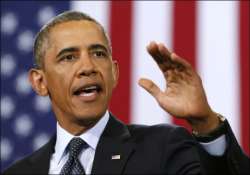APJ Abdul Kalam 'an advocate for stronger US-India relations': Barack Obama
Washington: US President Barack Obama has condoled the death of former Indian president A.P.J. Abdul Kalam describing him as an advocate for stronger US-India relations, and who worked to deepen the two countries' space cooperation.“A

Washington: US President Barack Obama has condoled the death of former Indian president A.P.J. Abdul Kalam describing him as an advocate for stronger US-India relations, and who worked to deepen the two countries' space cooperation.
“A scientist and statesman, Kalam rose from humble beginnings to become one of India's most accomplished leaders, earning esteem at home and abroad,” he said in a statement on Tuesday.
Extending his “deepest condolences to the people of India” on behalf of the American people, Obama noted Kalam's “tenure as India's 11th president witnessed unprecedented growth in US-India ties”.
“An advocate for stronger US-India relations, Kalam worked to deepen our space cooperation, forging links with NASA during a 1962 visit to the United States,” he said.
“Suitably named athe People's President, his humility and dedication to public service served as an inspiration to millions of Indians and admirers around the world.”
Meanwhile, the US media highlighted his role in advancing India's nuclear, space and missile programmes.
The influential New York Times in an obit said Kalam's “role in advancing India's nuclear programmes made him one of his country's most beloved figures”.
“Kalam's celebrity could be traced to 1998, when India detonated five nuclear devices in the northwestern desert, to widespread international condemnation,” it said.
“Described at the time as an ‘impish, shaggy-haired bachelor' of 66, he was one of the most exuberant boosters of the country's nuclear programme,” the Times said.
“Kalam spent a little time outside India. For him, it was a point of pride that India had developed its bomb without much help from foreign powers. And he described himself as thoroughly Indian,” the Times said.
“I am completely indigenous!” he told the newspaper in 1998, it recalled.
Time magazine described Kalam as “one of India's most renowned rocket scientists who served as the nation's 11th president”.
Kalam, it recalled told TIME in a 1998 interview that he developed an early fascination with flight while growing up on the south Indian isle of Rameswaram.
“Then there were a lot of birds on the island,” he was quoted as saying, “and I used to watch their beautiful flight paths. That got me interested in aeronautics.”
The Washington Post noted Kalam was “a scientist who was known as the father of the country's military missile programme”.
“He was credited with helping develop his country's first space satellites,” it said. “In the 1980s, he helped design the nuclear-capable Prithvi and Agni ballistic missiles.”
“He played a crucial role when India tested its nuclear weapons in 1998,” the Post said noting, “The test resulted in sanctions against the country but helped elevate Kalam's to the status of folk hero in his country.”
Several Indian-American organisations have also offered condolences on the death of “India's missile man”.
The Federation of Indian Associations (FIA) said along with the Indian-American community it mourns the “loss of our beloved and eminent scientist” who “was an irreplaceable role model for the young and passionate of India”.